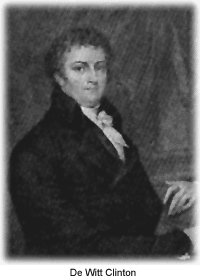 De Witt Clinton was born on March 2, 1769, in Little Britain, New York, the son of General James Clinton, who had served in the French and Indian and led New York troops in the Revolutionary war. He acquired the name "DeWitt" from his mother, Mary DeWitt, who was of Dutch ancestry. Clinton received his early instruction privately, and attended Kingston Academy and Columbia College (later University). While studying law in 1787, he published unsigned letters in the New York Journal in opposition to the U.S. Constitution and disagreeing with The Federalist Papers. After being admitted to the bar, he became in 1790 secretary to his uncle George Clinton, the first governor of New York State.
DeWitt Clinton was elected as a Republican to the New York Assembly in 1797 and the New York Senate in 1798. During his Senate term there he was a leading spokesman for Public Education, serving as head of the Free School Society of New York. Elected to the U.S. Senate in 1802, where he introduced the 12th Amendment to the Constitution, he resigned his seat in 1803 in order to become mayor New York City. In that office he remained until 1815 except for two annual terms.
Although an adherent of Jeffersonian principles and to the Republican party, Clinton also shared some interests with many Federalists, including manufacturing, banks, roads, and canals. In 1812, he was supported by the Federalists against James Madison, losing by an electoral vote of 128 to 89. His own Jeffersonian-Republican party deposed him from the mayorship in 1815.
Clinton's next office was the governorship of New York. His election in 1817 was due in no small part to his work on the Erie Canal. He had been an advocate since 1815 of canals between the Hudson River and lakes Champlain and Erie, and his actions contributed to the enactment of laws authorizing them.
Martin Van Buren and a faction of the Republicans known as "Bucktails" opposed Clinton and he did not seek re-election in 1822. However, there was popular resentment to his removal from the canal board and he was successful in his re-election campaign in 1824 under the banner of the People's party. As governor, he presided over the canal celebrations in 1825.
DeWitt Clinton had a remarkable range of interests outside politics. He was at once the president of the New York Historical Society, of the American Academy of Art, and of the Literary and Philosophy Society. He discovered a species of fish, wrote about swallows and passenger pigeons, and published a discourse on the progress of American science.
By his first wife Maria Franklin, he had 10 children. He died on February 11, 1828, in Albany, while still serving as governor.
De Witt Clinton was born on March 2, 1769, in Little Britain, New York, the son of General James Clinton, who had served in the French and Indian and led New York troops in the Revolutionary war. He acquired the name "DeWitt" from his mother, Mary DeWitt, who was of Dutch ancestry. Clinton received his early instruction privately, and attended Kingston Academy and Columbia College (later University). While studying law in 1787, he published unsigned letters in the New York Journal in opposition to the U.S. Constitution and disagreeing with The Federalist Papers. After being admitted to the bar, he became in 1790 secretary to his uncle George Clinton, the first governor of New York State.
DeWitt Clinton was elected as a Republican to the New York Assembly in 1797 and the New York Senate in 1798. During his Senate term there he was a leading spokesman for Public Education, serving as head of the Free School Society of New York. Elected to the U.S. Senate in 1802, where he introduced the 12th Amendment to the Constitution, he resigned his seat in 1803 in order to become mayor New York City. In that office he remained until 1815 except for two annual terms.
Although an adherent of Jeffersonian principles and to the Republican party, Clinton also shared some interests with many Federalists, including manufacturing, banks, roads, and canals. In 1812, he was supported by the Federalists against James Madison, losing by an electoral vote of 128 to 89. His own Jeffersonian-Republican party deposed him from the mayorship in 1815.
Clinton's next office was the governorship of New York. His election in 1817 was due in no small part to his work on the Erie Canal. He had been an advocate since 1815 of canals between the Hudson River and lakes Champlain and Erie, and his actions contributed to the enactment of laws authorizing them.
Martin Van Buren and a faction of the Republicans known as "Bucktails" opposed Clinton and he did not seek re-election in 1822. However, there was popular resentment to his removal from the canal board and he was successful in his re-election campaign in 1824 under the banner of the People's party. As governor, he presided over the canal celebrations in 1825.
DeWitt Clinton had a remarkable range of interests outside politics. He was at once the president of the New York Historical Society, of the American Academy of Art, and of the Literary and Philosophy Society. He discovered a species of fish, wrote about swallows and passenger pigeons, and published a discourse on the progress of American science.
By his first wife Maria Franklin, he had 10 children. He died on February 11, 1828, in Albany, while still serving as governor.